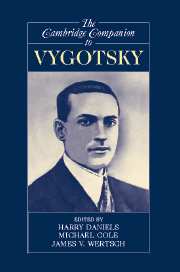Book contents
- Frontmatter
- Editors’ Introduction
- Part I: Vygotsky in Context
- 1 Vygotsky in Context: 1900-1935
- 2 Vygotsky’s Demons
- 3 An Interesting Resemblance: Vygotsky, Mead, and American Pragmatism
- 4 Vygotsky, Mead, and the New Sociocultural Studies of Identity
- 5 Vygotsky on Thinking and Speaking
- Part II: Readings of Vygotsky
- Part III: Applications of Vygotsky’s Work
- References
- Index
4 - Vygotsky, Mead, and the New Sociocultural Studies of Identity
from Part I: - Vygotsky in Context
Published online by Cambridge University Press: 28 November 2007
- Frontmatter
- Editors’ Introduction
- Part I: Vygotsky in Context
- 1 Vygotsky in Context: 1900-1935
- 2 Vygotsky’s Demons
- 3 An Interesting Resemblance: Vygotsky, Mead, and American Pragmatism
- 4 Vygotsky, Mead, and the New Sociocultural Studies of Identity
- 5 Vygotsky on Thinking and Speaking
- Part II: Readings of Vygotsky
- Part III: Applications of Vygotsky’s Work
- References
- Index
Summary
INTRODUCTION
Identity is a key concept in many different fields including psychology, anthropology, sociology, linguistics, and cultural studies. At the intersection of these fields, sociocultural research - a recent name for the interdisciplinary approach inspired by the cultural historical work of L. S. Vygotsky and others - is developing its own integrated perspective on identity. In his brief life, Vygotsky wrote down only rudimentary ideas about personality or self. Still, those he did offer, when combined with his general notions of semiotic mediation and higher-order psychological functions, formulate an important nascent understanding of identity formation and its significance for processes of social and cultural change. This chapter examines developments in relevant research and theory that have appeared, for the most part, since William Penuel and James Wertsch's key 1995 article. By adopting an expanded definition of identity, we include a wide range of research, from case studies of individual identity development to analyses of the centrality of identities in mediating response to state projects and to social movements.
Concepts of identity are often (although not in Penuel and Wertsch) promiscuously mingled, producing a good bit of confusion and ambiguity. Because we concentrate on the approach to identity associated with George Herbert Mead, rather than following Penuel and Wertsch's focus on Erik Erikson's better-known concept, our first task is to clarify the differences between these two major conceptualizations. Those who are tempted to move directly to the review of empirical studies in the “Sociocultural Studies of Identity” section in this chapter should consider first reading the clarification that follows.
- Type
- Chapter
- Information
- The Cambridge Companion to Vygotsky , pp. 101 - 135Publisher: Cambridge University PressPrint publication year: 2007
- 113
- Cited by



